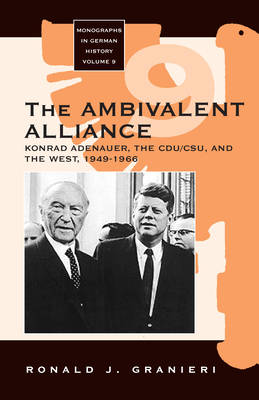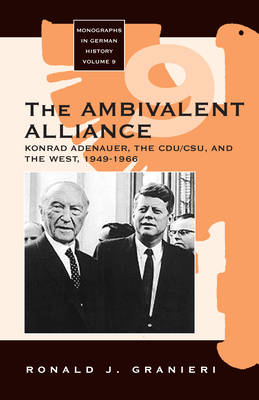
- Retrait gratuit dans votre magasin Club
- 7.000.000 titres dans notre catalogue
- Payer en toute sécurité
- Toujours un magasin près de chez vous
- Retrait gratuit dans votre magasin Club
- 7.000.0000 titres dans notre catalogue
- Payer en toute sécurité
- Toujours un magasin près de chez vous
Description
Whenever asked to name his most significant accomplishment as West Germany's first Chancellor, Konrad Adenauer would invariably reply: "The alliance with the free West." Scholars have echoed his assessment, citing the Federal Republic of Germany's successful integration into the American-led West (Westbindung) as the key to its postwar economic and political recovery. Behind this simple success story, however, lies a much more complicated history: Adenauer and the CDU/CSU remained ambivalent about the ultimate relationship between Europe, Germany, and the United States within the West, torn between visions of Continental European integration based on Franco-German reconciliation and of an Atlantic community linking Europe and the "Anglo-Saxons." These differences eventually erupted into a damaging public conflict between "Atlanticists" and "Gaullists," which colored Adenauer's last years and, after his retirement in 1963, led directly to the failure of his successor, Ludwig Erhard.
The opening of various personal and party archives over the past few years has now made the entire Adenauer Era accessible for historians. As one of the first efforts to use that material to re-examine existing conventional wisdom about the period, this book traces the roles of Adenauer and the CDU/CSU in shaping Westbindung. Adenauer emerges as a skilled and resourceful (if also mistrustful and devious) politician, and as a distinctly German statesman, maneuvering between allies and adversaries to shape both the Western community and the German role in it, leaving a legacy that still influences contemporary German-American and European-American relations.
Spécifications
Parties prenantes
- Auteur(s) :
- Editeur:
Contenu
- Nombre de pages :
- 288
- Langue:
- Anglais
- Collection :
- Tome:
- n° 9
Caractéristiques
- EAN:
- 9781571812728
- Date de parution :
- 01-01-03
- Format:
- Livre relié
- Format numérique:
- Genaaid
- Dimensions :
- 152 mm x 231 mm
- Poids :
- 589 g

Les avis
Nous publions uniquement les avis qui respectent les conditions requises. Consultez nos conditions pour les avis.






